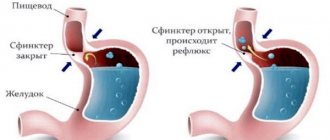Why does flatulence occur?
Bloating in the early stages is more common. This is due to the fact that a large amount of progesterone begins to be produced in the body of a pregnant woman.
The hormone is necessary for the preservation of the fetus: it relaxes the smooth muscles of the uterus. However, the muscle layers of other internal organs also lose strength.
As a result, the gastrointestinal tract organs contract less, the digestion process slows down, and stagnation appears, which leads to bloating.
In addition to progesterone, flatulence during pregnancy can be caused by:
- deficiency of enzymes necessary for digesting food;
- changes in diet: during pregnancy, women's taste preferences change, bloating is the body's natural response to changes in diet;
- stress;
- exacerbation of chronic gastrointestinal diseases;
- dysbacteriosis;
- high physical and mental overload;
- poor nutrition, excess carbohydrates and roughage, a lot of fatty foods, smoked foods;
- deficiency of vitamins, microelements, nutrients;
- low fluid intake;
- tight clothing pressing on the stomach;
- infectious diseases;
- bloating in the second trimester causes displacement and pressure of the growing uterus on the internal organs: intestines, stomach;
- parasitic infections;
- bad ecology.
Ways to prevent flatulence in early pregnancy
The expectant mother should follow a diet rich in vitamins, which does not contain foods that cause the accumulation of gases in the intestines. If you don’t want to have intestinal problems, then forget about overeating and try to control how much you eat. Doctors also do not recommend consuming fatty, difficult-to-digest foods and milk if you are lactose intolerant.
Pregnant women need to be outdoors as often as possible and lead an active lifestyle. Walking and moderate physical activity for pregnant women is what you need!
And do not forget that during pregnancy it is forbidden to wear uncomfortable and uncomfortable clothing that pinches the tummy.
Especially for beremennost.net – Elena Kichak
Manifestations of flatulence
The disease is characterized by the following manifestations:
- abundant gas formation, active release of gases;
- bothered by a constant feeling of heaviness in the stomach;
- loss of appetite;
- the stomach is swollen, bursting;
- your stomach is rumbling, you can hear gas bubbles bursting, food is overflowing;
- nauseated at any time of the day;
- problems arise with stool: constipation or diarrhea appear;
- cramping pain in the abdominal area;
- belching, bad breath.
Poor digestion leads to a woman’s well-being deteriorating. Poor appetite leads to loss of strength and weakness.
The pregnant woman begins to worry and worry about her condition. The result is changes in blood pressure, fatigue, dizziness, and heart rhythm disturbances.
What does pain with bloating mean?
Often, a nagging pain due to spasms is felt in the abdomen below the stomach. In this case, gases in the intestines can cause colic.
Other causes of flatulence with pain:
- weak, pulling, on the sides of the uterus - stretching of the ligaments of the organ under the weight of the fetus;
- spilled over the stomach - constipation or diarrhea;
- in the stomach – gastritis, other stomach problems;
- strong, in the area of the ovary - ectopic pregnancy;
- on the right in the iliac zone – appendicitis;
- contractions, pulling, intensifying in the lower abdomen, lower back - a sign of self-abortion.
If pain of any severity or localization occurs, a woman should consult a gynecologist-obstetrician. Medicines and folk remedies - only on the recommendation of the doctor managing the pregnancy.
When to see a doctor
Increased gas production during pregnancy is normal. However, this symptom should not be ignored, as it may indicate other diseases.
There are a number of symptoms that require immediate medical attention:
- severe diarrhea;
- nausea and vomiting;
- acute pain in the abdomen;
- dehydration of the body;
- complete lack of appetite;
- high temperature, fever;
- blood and mucus in the stool;
- long absence of trips to the toilet in large quantities (for 2-3 days or more).
A pregnant woman should be careful about her health. Deterioration in well-being, bad mood and weakness are not the only consequences of bloating.
Poor appetite causes a deficiency of nutrients, the fetus does not receive enough of them and develops incorrectly. Swollen intestinal loops crush the uterus and other internal organs, which can lead to serious consequences, including miscarriage.
What are the dangers of frequent bloating during pregnancy?
If you follow certain measures to prevent increased gas formation, then this condition does not entail any danger. However, it is worth considering that flatulence can cause strong pressure on the uterus and its subsequent tone, and this can lead to premature termination of pregnancy. Also, disturbances in the gastrointestinal tract can reduce the normal supply of all necessary substances for the development of the baby.
There are times when urgent medical attention is needed:
- lack of appetite, increased vomiting and diarrhea, threat of dehydration;
- temperature increase;
- stomach ache;
- blood and mucus impurities in the stool.
Ways to normalize bowel function
At the first sign of intestinal problems, action must be taken. You should not immediately grab pills and medicines, but your doctor should be warned. The first therapy is non-drug.
Nutrition adjustments
First of all, you need to review your diet and diet. You need to switch to fractional meals: reduce portion sizes and increase the frequency of meals. Each piece must be chewed thoroughly, and do not grab food in large pieces. The optimal position for eating is reclining.
Foods that cause gas formation should be excluded from the diet. This group includes coarse vegetables:
- radish,
- radish,
- raw cabbage,
- legumes,
- corn,
- pepper,
- eggplants.
Some fruits and berries aggravate the situation:
- apples,
- plums,
- peaches,
- apricots,
- grape.
Mushrooms and peanuts cause your stomach to swell. It is undesirable to eat all these products in any form: boiled, dried, salted. They always provoke increased gas formation.
In addition, you need to limit dairy products, carbonated drinks and kvass, yeast dough products, sweets and chocolate (any).
Fatty foods and smoked foods create extra stress on the digestive organs, so they should also be avoided.
What to add to your diet
There are a number of products that reduce gas formation, promote the collapse of air bubbles and their exit from the body.
These need to be added to your diet:
- Fresh herbs have a good effect: dill, parsley, cilantro. Adding them to salads is a must;
- lean meat, fish, poultry;
- all seafood has a good effect on digestion;
- cereals and porridges: rice, oatmeal without milk, crumbly buckwheat;
- whole wheat bread;
- boiled, carrots, beets;
- green tea.
Physical activity and rest
To normalize intestinal function and eliminate gases during pregnancy, it is necessary to put your daily routine in order, as well as provide the body with sufficient physical activity.
For example, when walking, the abdominal muscles contract and massage the intestines, normalizing its peristalsis. A sedentary lifestyle, even in healthy people, causes stagnation in the body. During pregnancy, the risks increase.
It is necessary to reconsider the daily routine. Sleep at night should take 8-10 hours. Daytime breaks are also necessary, when a woman can take a nap or lie down to rest for 15-30 minutes.
Remembering about rest, you must not forget about sufficient physical activity. Excessive activity is fraught with negative consequences, but feasible exercise has a beneficial effect.
For expectant mothers, walks in the fresh air, special gymnastics, swimming and water aerobics are useful. It is advisable to do breathing exercises. In this case, you should choose clothes that are comfortable, do not restrict movement and do not compress the stomach.
Pauses after eating are useful, during which the expectant mother will massage the abdomen. Movements should be smooth, stroking, without sudden pressure. The hand moves in a circle clockwise.
Prevention
If there is a clear predisposition to increased gas formation, a woman is recommended to:
- Wear clothes that fit the size, do not press, and do not restrict movement. Corsets, belts, belts are removed while the child is pregnant.
- Daily walks in the fresh air, light exercise.
- Proper nutrition, exclusion of gas-forming foods from the diet. Eating should be done frequently. In this case, portions should be small.
- Calm environment, no stress. A woman’s unstable emotional state involves taking sedatives of herbal origin. Pregnancy is a good time to engage in your favorite hobby and watch positive films.
- Healthy sleep, at least 8-9 hours.
- Completely eliminate bad habits, avoid smoking areas.
- At the first signs of digestive disease, notify your doctor.
- Avoid chewing gum and drinking carbonated drinks.
If the bloating is constant, your stomach hurts, and medications and diet do not help, it’s time to consult a gastroenterologist. Pathologies of the gastrointestinal tract should be treated by a doctor.
Increased gas formation seriously complicates the life of pregnant women. But the phenomenon is easily eliminated by following a diet and diet. Flatulence caused by pregnancy goes away as soon as the baby is born.
Methods for treating flatulence during pregnancy
A woman’s position imposes restrictions on the choice of methods for treating bloating during pregnancy. It is necessary to select products that are completely safe for the expectant mother and baby.
You can relieve symptoms with the help of medications and folk remedies. In any case, you need to consult a doctor. The specialist will help you choose a treatment method and, if necessary, prescribe additional examinations so as not to miss the possible onset of a gastrointestinal tract disease.
For bloating, medications are prescribed that collapse gas bubbles, carminatives based on natural ingredients, and agents that normalize intestinal function and restore the healthy microflora of the organ. Chemicals that affect the fetus and woman are contraindicated.
Traditional methods are very popular. For example, dill water is completely harmless to the female body, but it has a strong carminative effect. The preparation is simple: 1 tbsp. l. dill seeds pour 2 tbsp. boiling water and cool. The infusion is ready. They drink it 0.5 tbsp. before eating.
You can use an infusion of coriander seeds. 1 tbsp. l. pound and pour a glass of boiling water. Take ½ tbsp. before eating.
Causes and symptoms of bloating during pregnancy
The article was prepared by a specialist for informational purposes only. We urge you not to self-medicate. When the first symptoms appear, consult a doctor.
Causes of bloating during pregnancy
Expectant mothers quite often face the problem of bloating during pregnancy. The main reason for this common phenomenon is that the uterus expands, putting pressure on the intestines. Usually this problem becomes most pressing with the enlargement of the fetus in the second or third trimester of pregnancy.
Also, due to changes in the hormonal background of a woman carrying a child, intestinal tone decreases and digestion becomes difficult, which leads to the accumulation of gases and the appearance of unpleasant sensations.
Often pregnant women experience a deterioration in the functioning of the pancreas and, as a result, a lack of enzymes for digesting food. This factor can also cause flatulence.
There are cases when bloating, which was observed before pregnancy, noticeably intensifies after conceiving a child. Most likely, the cause of this is a chronic disease of the gastrointestinal tract. In this case, you need to see a doctor and undergo an examination to determine the root cause.
It is also worth consulting with a specialist in a situation where flatulence, which previously bothered a woman extremely rarely, occurs suddenly and does not go away within several days. Such bloating may not appear due to pregnancy, but as a result of some acute illness.
Treatment for bloating during pregnancy
Although pregnancy itself can cause bloating, this does not mean that it should not be treated. Since this process is accompanied by unpleasant sensations, it can affect the general condition of the expectant mother.
In folk medicine, there are many ways to combat this disease.
You can use teas and infusions from various medicinal herbs and plant seeds. For example, a decoction of coriander very quickly calms bloating. To do this, grind 1 teaspoon of coriander seeds and pour a glass of hot water and boil for a couple of minutes. The infused and strained decoction is drunk three times a day before meals.
If flatulence accompanies gastritis with low acidity of gastric juice or constipation, then it is worth taking 1 tablespoon of infusion from the leaves of the watch 3-4 times a day. For a glass of boiling water you need to take 2 teaspoons of dried leaves, leave for 1 hour and strain.
In cases where bloating is not a symptom of any disease, but is simply the body’s reaction to a particular food, you can cope with it by changing your diet.
First of all, you should reduce the consumption of foods that provoke excessive gas production. These include legumes, cabbage, most fresh vegetables and black bread. Naturally, they should not be abandoned completely for the entire period of pregnancy. You should stop eating these foods during an exacerbation of flatulence, and at all other times you just need to reduce their amount in the menu. Eating vegetables in moderation is unlikely to harm a healthy pregnant woman and will not cause her any discomfort.
In addition, the well-being of pregnant women is affected not only by what to eat, but also how. Constant overeating will only worsen digestion and cause constant heaviness in the stomach. Try to eat in small portions, if you want, then more often, but little by little.
Kefir or yogurt before bed can serve as a preventative against digestive problems, as they contain bacteria that help the body process food.
For acute attacks of flatulence in pregnant women, it is also possible to use various medications for bloating.
It is very important to remember one rule: no matter what the reasons for bloating in pregnant women and no matter what treatment methods are used (traditional or traditional medicine), you should consult a doctor before using them. A specialist will help identify the cause of the ailment and suggest a treatment method depending on the diagnosis and individual characteristics of the body.
Author of the article:
Gorshenina Elena Ivanovna |
Gastroenterologist Education: Diploma in General Medicine received from the Russian State Medical University named after. N. I. Pirogova (2005). Postgraduate course in the specialty "Gastroenterology" - educational and scientific medical ]Our authors[/anchor]
Eliminating flatulence in the first weeks of pregnancy
What to do if you have flatulence? In some cases, it is necessary to use special medications that will help eliminate bloating.
Medicines for flatulence
To reduce abdominal bloating in early pregnancy, doctors prescribe treatment with enzyme preparations. However, it is worth remembering that self-medication in this case is unacceptable. The most effective enzyme agents were Mezim, Festal, Pancreatin.
To quickly relieve symptoms of flatulence, you can use Espumisan, but you should consult with your doctor about taking this medication so as not to harm the fetus. In cases where dysbiosis was detected in a woman during diagnosis, she should undergo a course of therapy with drugs containing bacteria that have a beneficial effect on the large intestine.
This category of drugs includes probiotics (Narine, Normoflorin-L). In addition, you should take prebiotics, which promote the active reproduction of beneficial microflora, and sedatives made from herbs to calm you down.
To quickly relieve symptoms of flatulence, you can use Espumisan
Diet
In cases where the cause of flatulence in early pregnancy is poor nutrition, the first step is to review and change the nutritional system. To reduce the formation of gases in the intestines, it is necessary to reduce the consumption of products that provoke the occurrence of fermentation and the formation of gases in the body.
To eliminate signs of an unpleasant condition from the menu, experts advise completely eliminating:
- marinades;
- baking;
- carbonated drinks;
- Rye bread;
- cabbage;
- bran;
- asparagus;
- fatty foods;
- legumes
In addition, it is recommended to reduce the consumption of sweet foods, fresh fruits and vegetables. It is recommended to eat food in small portions at equal intervals. During the diet, it is important to adhere to the following rules. Chew food thoroughly during meals. We are not distracted by conversations while eating to avoid swallowing large portions of air.
We give preference to stewed and boiled food. We drink at least 1.5-2 liters of clean drinking water every day. In addition, you can drink weak tea, herbal decoction and kefir. We monitor the regularity of bowel movements every day. For constipation, you should add to your diet a fresh salad dressed with olive oil and low-fat kefir or yogurt. Prunes, which should be consumed daily before bed with a fermented milk drink, can also help loosen stools.
Physical exercises and stress
When there is a problem with the intestines and bloating appears during pregnancy, medical experts recommend increasing physical activity, which helps speed up the digestion process and quickly remove accumulated gases from the intestines. Long walks before bedtime, especially in pleasant company, will be very useful.
Note! Any sport and physical activity for a woman during pregnancy should be dosed.
Also, in the early stages, physical activities such as belly dancing, swimming, and yoga for pregnant women are good. Any lesson should be conducted under the supervision of an instructor, who will individually set the pace of the load. It is also very useful to massage the abdomen, which helps activate intestinal peristalsis and relieves bloating.
To perform a massage, you need to gently and smoothly stroke the stomach in a clockwise direction. It is enough to perform such movements for 8-10 minutes. A visit to a particular sport should be discussed in advance with your doctor, since during pregnancy there are many contraindications that are important to adhere to when performing physical exercises.
When there is a problem with the intestines and bloating appears during pregnancy, medical experts recommend increasing physical activity
What else can you do to eliminate flatulence?
With flatulence, you can relieve unpleasant symptoms with the help of herbal remedies, namely, this will quickly help:
- infusion based on carminative herbs (cumin, fennel and mint);
- Dill water;
- green tea;
- rowan tincture;
- decoction based on coriander.
Herbal remedies are recommended to be used every day 30 minutes before meals. Experts advise trying herbal tea or tincture based on chamomile and lemon balm for bloating. An unpleasant, but no less effective remedy for excessive gas formation will be a cleansing enema, which will eliminate the unpleasant sensation in a short time.









